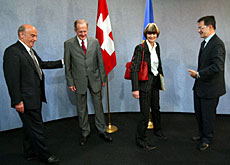Diplomats reveal tricks of the trade

It is thanks to civil servants like Michael Ambühl that events such as the Swiss-European Union summit on Wednesday are possible.
But these diplomats hardly ever appear on the photographs. They work behind the scenes.
Unlike other countries, Switzerland doesn’t have special training schools for diplomats.
However, this doesn’t prevent them from having top-notch negotiators – as the bilateral accords between Switzerland and the EU demonstrate.
“It is totally accepted, indeed respected that a country like Switzerland stands up for its interests,” Ambühl, head of the Swiss-EU Integration Office, told Swiss French radio.
“What’s important is to be consistent and play fair when you defend your position,” added the principal architect of the deal with the EU.
“Ultimate success comes when you’ve got parliamentary approval, and, in the case of a referendum, popular approval.”
Strategy
There’s no doubt that Swiss diplomacy has been effective. “It underlines the quality and competence of our negotiators,” said Pierre Dubois of the Graduate Institute for International Studies in Geneva.
He added that it was sensible choice to select Ambühl who devised the negotiating strategy.
But strategy is just one part of the equation. “The chief negotiator also has to coordinate the working teams who are responsible for each of the topics under discussion,” said Luzius Wasescha, a senior Swiss trade official.
“He has to keep on eye on balancing the give and take around the negotiating table.”
The role requires a range of qualities which are often acquired on the job. “Our diplomats gain their skills hands-on,” said Dubois.
Experience
“I learnt this trade, drafting the minutes of the meeting between Switzerland and the European Community (the first free-trade agreement of 1972),” said former secretary of state, Franz Blankart.
Blankart, who was also the chief negotiator during the negotiations on the European Economic Area, stresses the value of observation in learning the tricks of the trade.
It’s a view shared by Cornelio Sommaruga, who like Franz Blankart, was a former state secretary for economic affairs.
Sommaruga based his working methods on three principles – know your discussion partners and create a good rapport with them; know your subject inside out; be clear on your goals and stick rigidly to them.
These principles shouldn’t stop you exploiting your opponent’s weaknesses. “A negotiator doesn’t have to be liked. He must be respected,” said Blankart.
Like every game involving strategy, the negotiator must employ a wide range of tactics. Blankart reveals one of them.
“The Chinese discovered it a thousand years ago,” said Blankart. “It consists of opposing a perfectly acceptable proposition so that you can later accept it in a spirit of compromise and trade it off against something else.”
“It’s as simple as it’s effective but it’s only a possibility if the press doesn’t get wind of it.”
Training
When they join the Swiss foreign ministry, trainee diplomats have a year’s apprenticeship (three months in Bern and the rest of the year at a Swiss embassy).
“Initiation in the arts of negotiation lasts a week in Brussels,” said Sabine Ulmann, who handles training and recruitment at the foreign ministry.
“When they’ve finished, the diplomats have regular training courses, linked to the tasks they have to deal with.”
The other “centre of competence” when it comes to international negotiations is to be found at the State Secretariat for Economic Affairs (SECO).
“New arrivals have courses in negotiating techniques including theory and practice,” said Wasescha.
“When a negotiating theme emerges, we form a team which includes people from all the relevant ministries. All these people take courses so that they can carry out their new task.”
Historic role
SECO benefits from its ties with the Swiss economy. “Companies which work abroad supply us with invaluable information about the countries we’re negotiating with,” said Wasescha.
“This local knowledge is one of our biggest assets.”
According to the Swiss historian, Hans-Ulrich Jost, this practice has been going on for some time.
“At the end of the 1940s, the government gave a mandate to the private sector – big industrialists or bankers – to defend its interest on the international stage.”
Jost added that as far as negotiations are concerned, the main stakes have not changed really changed much since this time.
“Don’t over-estimate the strategies and aims of the Swiss negotiators,” he said. “Often, it’s a question of protecting the revenues of companies which operate internationally.”
swissinfo, Frédéric Burnand in Geneva
A winning strategy:
In the first round of bilateral negotiations, the EU insisted on dealing with all the issues as one package.
In this round, Switzerland adopted the same approach. The EU was unable to get a deal on the savings tax directive without reaching agreement on the other dossiers.
Since it was vital for the EU to get a deal on the savings tax directive, Switzerland had a good bargaining position.

In compliance with the JTI standards
More: SWI swissinfo.ch certified by the Journalism Trust Initiative











You can find an overview of ongoing debates with our journalists here . Please join us!
If you want to start a conversation about a topic raised in this article or want to report factual errors, email us at english@swissinfo.ch.